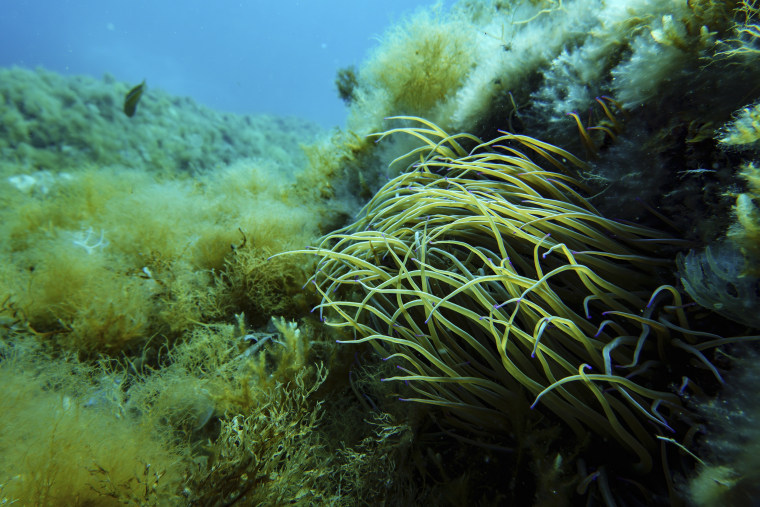Prince William says ocean conservation is a challenge like no other ahead of U.N. summit
The third U.N. Ocean Conference opens Monday, with Britain’s Prince William among those raising the pressure on nations to turn decades of promises into real protection for the sea.
The summit comes as just 2.7% of the ocean is effectively protected from destructive extractive activities, according to the nonprofit Marine Conservation Institute. That is far below the target agreed under the “30×30” pledge to conserve 30% of land and sea by 2030.
Atop this year’s agenda is ratification of the High Seas Treaty. Adopted in 2023, the treaty would for the first time allow nations to establish marine protected areas in international waters, which cover nearly two-thirds of the ocean and are largely ungoverned.
Speaking ahead of the conference, Britain’s Prince William said Sunday that rising sea temperatures, plastic pollution and overfishing were putting pressure on fragile ecosystems and the people who depend on them.
“What once seemed an abundant resource is diminishing before our eyes,” William, heir to the British throne, told the Blue Economy and Finance Forum in Monaco. He described the challenge as being “like none we have faced before”.
“Put simply: the ocean is under enormous threat, but it can revive itself. But, only if together, we act now,” he told the meeting of investors and policymakers.

Mauro Randone, regional projects manager at the World Wildlife Fund’s Mediterranean Marine Initiative, said that “it’s the Wild West out there with countries just fishing anywhere without any sort of regulation, and that needs to change.”
“The high seas belong to everyone and no one practically at the same time, and countries are finally committing to establish some rules,” he added.
The ocean is critical in stabilizing Earth’s climate and sustaining life. It generates 50% of the oxygen we breathe, absorbs around 30% of carbon dioxide emissions and captures more than 90% of the excess heat caused by those emissions. Without a healthy ocean, experts warn, climate goals will remain out of reach.
The treaty will only come into force once 60 countries ratify it. As of Monday, just 32 countries had. Advocates hope UNOC can build enough momentum to cross the threshold, which would allow for the first official Oceans Conference of Parties.
“Two-thirds of the ocean is areas beyond national jurisdiction — that’s half our planet,” said Minna Epps, director of global ocean policy at the International Union for Conservation of Nature. “We cannot possibly protect 30% of the ocean if it doesn’t include the high seas.”
South Korea, France and the European Union have championed the treaty, but most large ocean nations have yet to ratify it, including the rest of the G20. Thousands of attendees are expected in Nice, from delegates and heads of state to scientists and industry leaders. The United States has yet to confirm a formal delegation.
Beyond new commitments, the conference highlights the growing gap between marine protection declarations and real-world conservation.
France, the conference co-host, claims to have surpassed the 30% target for marine protection. But environmental groups say only 3% of French waters are fully protected from harmful activities such as bottom trawling and industrial fishing.

“The government declares these as protected areas, but this is a lie,” said Enric Sala, founder of the National Geographic Pristine Seas marine reserve project. “Most of it is political box-ticking. It’s all paper parks.”
That criticism is echoed across the continent. A new World Wildlife Fund report found that although more than 11% of Europe’s marine area is designated for protection, just 2% of E.U. waters have management plans in place.
Fabien Boileau, director of marine protected areas at France’s Office for Biodiversity, acknowledged the presence of bottom trawling in French protected areas, but said it was part of a phased strategy.
“In France, we made the choice to designate large marine protected areas with relatively low levels of regulation at first, betting that stronger protections would be developed over time through local governance,” he said. “Today, we’re gradually increasing the number of zones with stricter protections within those areas.”
Advocates say industrial fishing lobbies continue to resist stricter protections, despite evidence that well-managed reserves boost long-term fisheries through the “spillover effect,” whereby marine life flourishes in nearby waters.
“Protection is not the problem — overfishing is the problem,” Sala said. “The worst enemy of the fishing industry is themselves.”
The conference will feature 10 panels on topics such as blue finance, sustainable fisheries and plastic pollution. Deep sea mining is expected to feature in broader discussions, while small island states are likely to use the platform to advocate for increased climate adaptation funding.
The outcome of these discussions will form the basis of the Nice Ocean Action Plan, a declaration of voluntary commitments to be adopted by consensus and presented at the United Nations in New York this July.
“There cannot be a healthy planet without a healthy ocean,” said Peter Thomson, U.N. special envoy for the ocean. “It’s urgent business for us all.”



